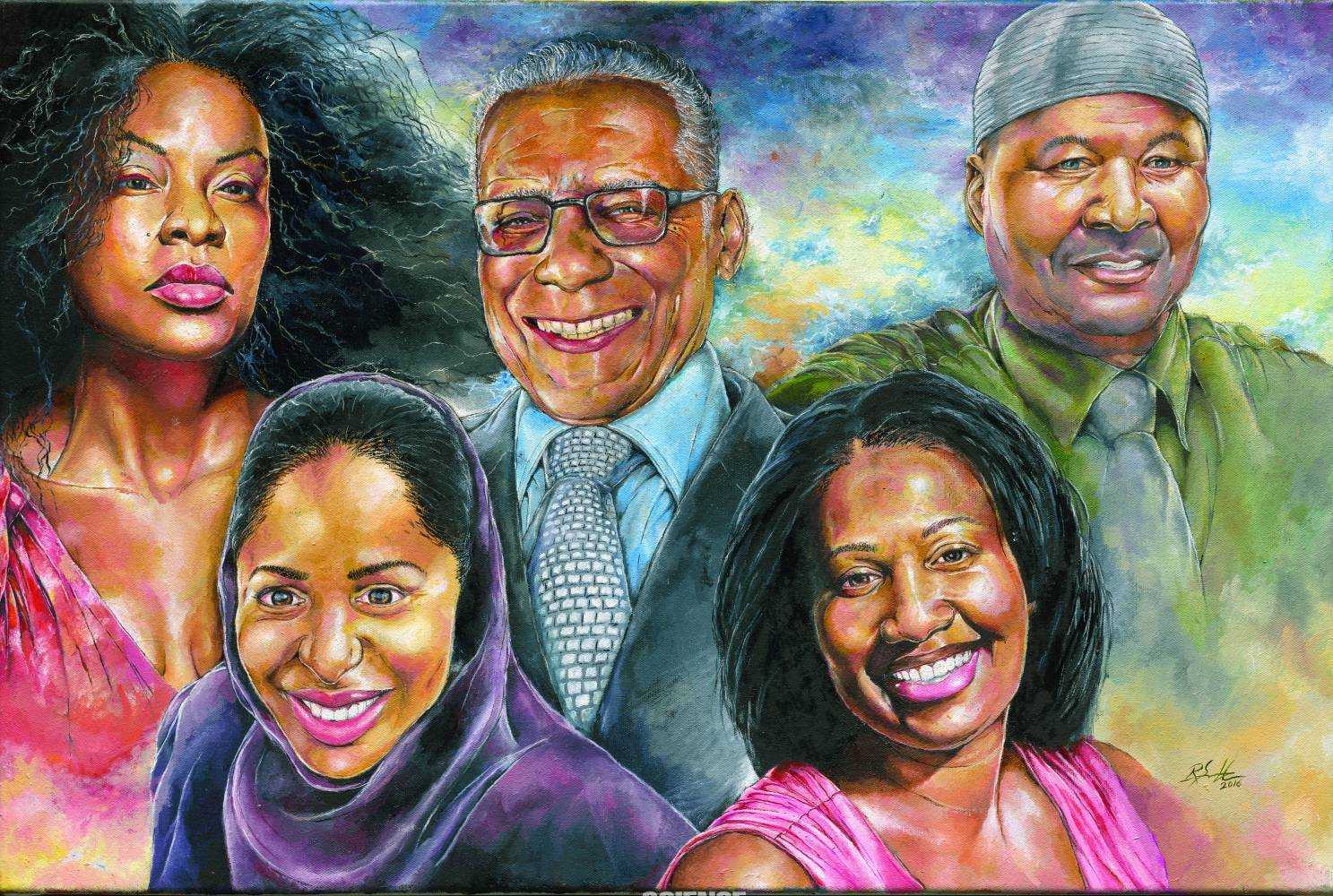on
BY ALYSSA MAHADEO
Everyone must leave something behind when they depart from this world. The greatest legacy that we can pass on to the next generation is not money or other material things that we have accumulated throughout our lives, but rather a legacy of knowledge, understanding and solutions to the challenges that we have faced during our time in existence.
Every February Black History Month is observed throughout North America. Also, known as African-American History Month, it is a remembrance of important people and events in the history of the African diaspora. Black History Month festivities and celebrations are celebrated throughout the month and many community organizations have chosen to carry on the message of their ancestors throughout the entire year.
For the past twenty-three years, local Toronto artist Robert Small has presented his own legacy in the form of his Black History Month Legacy Poster. Using his god given talent of artistry and mastery of the paintbrush Robert has produced paintings every year featuring African-Canadians who have excelled in science, technology, engineering, the arts and math.
“This year’s poster focuses on five individuals that have excelled in Science, Technology, Arts and Math,” shares Small. “The reason why I chose to focus on those things is because those are careers that will be of high demand in the future especially given the fact of where technology is headed there is a need for youth to be positioned in a way where they can take advantage of opportunities that come in the future.”
Robert Small’s artistic career began at the age of sixteen, and went from having his artwork published in a city-wide newspaper to it being displayed in twenty TTC subway locations across the GTA. Searching for a way to garner interest in Black History Month, Small demonstrated incredible initiative by creating a poster called The Official Black History Month Poster in 1995. He has played a central part in elevating awareness of Black History Month through his art ever since. Robert is a self-taught artist. He graduated from the University of Windsor with a degree in Sociology and a certificate in Criminology. He is also a certified teacher graduating from Teacher’s College at York University. He presently sits on the board of the Ontario National Association of Black School Educators (ONABSE) and is an active member of the Caribana Arts Group.
Small is the founder of LEGACY Enterprises, a cutting edge, innovative company that uses art as a powerful technique to educate society about the accomplishments of people throughout history who have left us incredible breakthroughs to conquer the world today. LEGACY Enterprises has committed to be a powerful advocate for making school spaces conducive to culturally relevant teachings and transforming community areas into being reflective of our society. We also partner with community business and organizations to build intellectual and culturally empowering capacity in community members to propel society forward.
LEGACY 2017, is the most important piece ever released in the twenty-three-year history of this poster, as it focuses on five African-Canadians who have made great strides in the development and advancement of Science, Technology and The Arts and are role models to the next generation of aspiring Scientists, Artists and Educators.
LEGACY 2017 is a vibrant and bold monumental tribute featuring scientist and politician Howard McCurdy, technological pioneer Leesa Renee Hall, civil engineer and entrepreneur Nasra Agil, Canadian songstress Jully Black and educator Kenneth Fells. Much like the film released earlier this year, these Hidden Figures of society have left a significant mark in their respective fields contributing to the development of many new ideas that are being implemented in the world today.
Through his delicate brushstrokes and steady hand, Small has created an organic representation of African-Canadian accomplishments in his 2017 Legacy Poster. “Art requires you to be creative and in turn allows you to invent different things or think of different ways thing can be applied in the other subjects,” says Small describing the importance of including the arts as one of the subjects that students should continue to focus and choose to pursue. “It is just as important and helpful as any of the other subjects, because it allows for a different technique, a more hands on approach of knowledge intake.”
Howard Douglas McCurdy, mostly recognized by his political career as a Member of Parliament also holds a degree in Microbiology as well as a Master Degree and PhD in Microbiology and Physical Chemistry later joining the Biology Department of Biology at Windsor University.
Author, futurist and technology pioneer Leesa Renee Hall is known for her ability to spot trends, ignore fads and galvanize people around an innovative idea to ignite growth and inspire change. She is the author of seven publications and is admired for her ability to jump start movements such as an association for Blacks working in Technology.
Somali-Canadian Nasra Agil studied civil engineering at Ryerson University where she graduated top of her class and received an Honours Bachelor of Engineering Degree. In 2012 she returned to Somalia to contribute to the local post-conflict reconstruction process. In addition to being a partner at one of the country’s leading Architectural firms, she also serves as an Infrastructure Adviser to the Federal Government of Somalia.
Bold, fierce and powerful Canadian Icon Jully Black is a powerful woman whose presence cannot be ignored. Dubbed Canada’s Queen of R&B Soul, she is a platinum selling recording artist and her music career has yielded multiple chart topping singles in Pop, R&B and Dance Music. Jully’s love of people and passion for philanthropy has taken her across the world championing important causes using her career as a platform to inspire other and celebrate the greatness within us all.
Last, but not least Kenneth M. Fells is a Principal and Africentric Philosophical activist who is dedicated to improving both the educational experiences and accomplishments of African-Canadians.
“When I think about who I would like to feature on the poster, I really wanted to find people who are different with respect to age, mentality, gender as well as their ability,” says Small. “Art is integral to the development of engineering and technology because, eventually half of the ideas for the future will need to be drawn out or designed by somebody and so the artistic ability will need to be utilized to put those ideas down on paper.” Small explains.
In addition to the LEGACY Poster, for BHM Small has released another STEAM booklet created to allow the uses of art and creativity that naturally flows through it to make youth more interested in the sciences, technology, engineering and math. The booklet is twenty pages filled with exciting questions, games, puzzles and historical material related to African accomplishments from around the world. Each section contains suggestions for teachers and parents to engage students further about STEAM. This book is aimed at youth who are at a Grade 4/5 level.
“This year’s booklet focuses on Canadian events, and a portion focusing on Viola Desmond where I tell her story and then I ask the students to create a dollar bill, and design a bill based upon the story of Viola Desmond,” Small shares. “There is also a special area that focuses on financial literacy and how to invest in the stock market which I included because our parents didn’t know much about the stock market, but the advantages about teaching children about it now open the conversation and allow them to learn about something that will be beneficial to them in the future.
The STEAM booklet is available for download online Afroebooks.com and it can also be ordered at www.thelegacyposter.com.
When we leave this world, all that we leave behind becomes lessons for the next generation and our legacy is to promote growth, educate the community and help future generations to overcome what we could not. With all of the news being shared and reported by the mainstream media, it’s easy to fall victim to the propaganda and negative opinions of others. The Legacy poster is a step in the right direction, a great way to shed light on the accomplishments of the African-Canadians as well as combat the negativity that has been affecting the community through the mainstream media. These people have contributed amazing things to Canadian society a reflection of the potential that the community has to offer.
What will you leave behind? What movement will you start and what would you like to help the world discover next? This is our time, ensure that the legacy you leave behind is a great one.
Stay in the loop with exclusive news, stories, and insights—delivered straight to your inbox. No fluff, just real content that matters. Sign up today!













